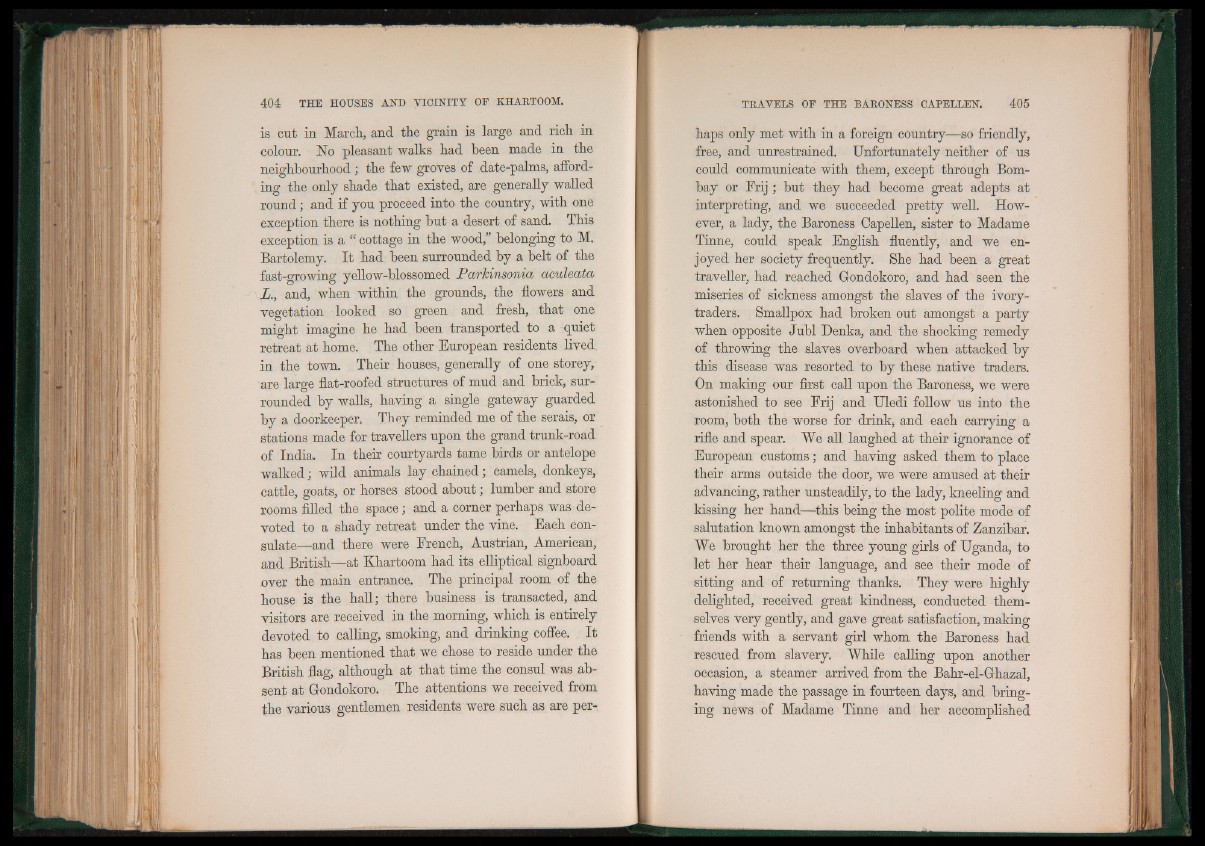
is cut in March, and the grain is large and rich in
colour. No pleasant walks had been made in the
neighbourhood ; the few groves of date-palms, affording
the only shade that existed, are generally walled
round; and if you proceed into the country, with one
exception there is nothing but a desert of sand. This
exception is a “ cottage in the wood,” belonging to M.
Bartolemy. I t had been surrounded by a belt of the
fast-growing yellow-blossomed Parkinsonia aculeata
L., and, when within the grounds, the flowers and
vegetation looked so green and fresh, that one
might imagine he had been transported to a quiet
retreat at home. The other European residents lived,
in the town. Their houses, generally of one storey,
are large flat-roofed structures of mud and brick, surrounded
by walls, having a single gateway guarded
by a doorkeeper. They reminded me of the serais, or
stations made for travellers upon the grand trunk-road
of India. In their courtyards tame birds or antelope
walked; wild animals lay chained; camels, donkeys,
cattle, goats, or horses stood about; lumber and store
rooms filled the space; and a corner perhaps was devoted
to a shady retreat under the vine. Each consulate—
and there were French, Austrian, American,
and British—at Khartoom had its elliptical signboard
over the main entrance. The principal room of the
house is the hall; there business is transacted, and
visitors are received in the morning, which is entirely
devoted to calling, smoking, and drinking coffee. I t
has been mentioned that we chose to reside under the
British flag, although at that time the consul was absent
at Gondokoro. The attentions we received from
the various gentlemen residents were such as are perhaps
only met with in a foreign country—so friendly,
free, and unrestrained. Unfortunately neither of us
could communicate with them, except through Bombay
or F rij; but they had become great adepts at
interpreting, and we succeeded pretty well. However,
a lady, the Baroness Capellen, sister to Madame
Tinne, could speak English fluently, and we enjoyed
her society frequently. She had been a great
traveller, had reached Gondokoro, and had seen the
miseries of sickness amongst the slaves of the ivory-
traders. Smallpox had broken out amongst a party
when opposite Jubl Denka, and the shocking remedy
of throwing the slaves overboard when attacked by
this disease was resorted to by these native traders.
On making our first call upon the Baroness, we were
astonished to see Frij and Uledi follow us into the
room, both the worse for drink, and each carrying a
rifle and spear. We all laughed at their ignorance of
European customs; and having asked them to place
their arms outside the door, we were amused at their
advancing, rather unsteadily, to the lady, kneeling and
kissing her hand—this being the most polite mode of
salutation known amongst the inhabitants of Zanzibar.
We brought her the three young girls of Uganda, to
let her hear their language, and see their mode of
sitting and of returning thanks. They were highly
delighted, received great kindness, conducted themselves
very gently, and gave great satisfaction, making
friends with a servant girl whom the Baroness had
rescued from slavery. While calling upon another
occasion, a steamer arrived from the Bahr-el-Ghazal,
having made the passage in fourteen days, and bringing
news of Madame Tinne and her accomplished